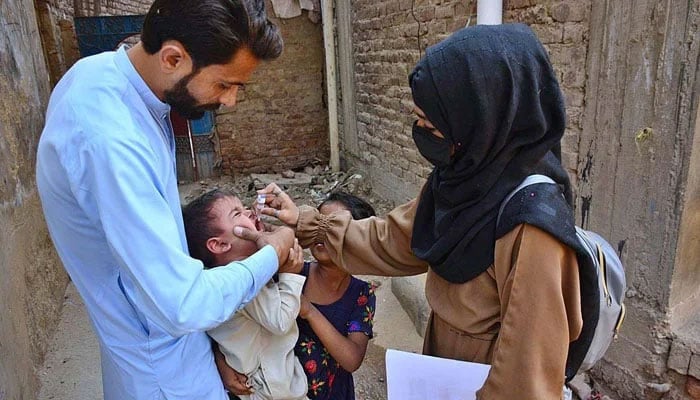The polio loop
Pakistan remains one of the few countries where efforts to eradicate polio appear stuck in reverse
It is disheartening that writing about the spread of polio in Pakistan has become a routine affair, a grim task that underscores our nation’s persistent struggle against a disease that the rest of the world has largely managed to contain. Pakistan remains one of the few countries where efforts to eradicate polio appear stuck in reverse. Our anti-polio drives seem to mirror the myth of Sisyphus: no matter how hard the government pushes the boulder of vaccination campaigns uphill, it inevitably rolls back down. The recent spike in polio cases is alarming. Khyber Pakhtunkhwa has reported its first case, bringing the national total to 21. In Balochistan, 14 children have already been affected. These numbers serve as a grim reminder that despite years of effort and millions spent, we are no closer to eradicating the virus. This begs the question: where did we go wrong?
One major factor is growing vaccine hesitancy. Despite repeated warnings from health experts, the government has failed to adequately address the myths and conspiracies that fuel this hesitancy. Social media and other communication platforms, which could be powerful tools for spreading awareness, remain underutilized. Instead, the government relies heavily on door-to-door vaccination campaigns, which, while admirable, are insufficient on their own. But vaccine hesitancy is not the only obstacle. Attacks on polio workers and the security personnel who accompany them have made these campaigns even more dangerous. Militants, particularly in parts of KP, reportedly fear that vaccination drives will reveal their hiding locations, leading to verbal threats and violent attacks on health workers. These assaults have become a major deterrent, discouraging health workers from participating in such life-saving efforts. On top of this, the recent rape case of a polio health worker points to the scant security that these workers get. Our society has always been unkind towards women who dare to step out of their houses to earn a living. Lady health workers often find themselves at the receiving end of verbal abuse from households who see such health campaigns as a conspiracy. Now, the risk of sexual assault will act as a deterrence for most workers, and rightly so. In the absence of the government’s foolproof security, why should anyone be expected to deliberately put their life in danger?
In addition to these immediate threats, there is a deeper, systemic problem: a widespread mistrust of state-backed healthcare services. Years of negligence, botched treatments, and poor medical infrastructure have left many citizens wary of any government initiative, no matter how crucial. This mistrust only compounds the challenges faced by the polio eradication programme. To break out of this endless loop, the government must rethink its strategy. First and foremost, a comprehensive survey is needed to understand the root causes of vaccine refusal. Only by identifying the reasons behind this reluctance can the authorities tailor their campaigns more effectively. Second, all healthcare providers, including private clinics, should be brought on board to raise awareness about the importance of polio vaccines. These clinics often have more direct and trusted relationships with local communities, making them ideal partners in the fight against polio. Additionally, offering incentives to parents could help encourage them to vaccinate their children. Simple rewards, such as coupons for toy stores, bookstores, or snack shops, could make a significant difference in motivating parents. The future of our children is being jeopardized by the stubbornness of adults and the inaction of the government. It is imperative that the state steps up its efforts to protect them from a lifetime of disability caused by a preventable disease.
-
 50 Cent Super Bowl Ad Goes Viral
50 Cent Super Bowl Ad Goes Viral -
 'The Housemaid' Lifts Company's Profits: Here's How
'The Housemaid' Lifts Company's Profits: Here's How -
 Michael Douglas Recalls Director's Harsh Words Over 'Wall Street' Performance
Michael Douglas Recalls Director's Harsh Words Over 'Wall Street' Performance -
 Henry Czerny On Steve Martin Created Humor On 'Pink Panther' Set
Henry Czerny On Steve Martin Created Humor On 'Pink Panther' Set -
 Lady Victoria Hervey: Andrew Mountbatten-Windsor's Ex-girlfriend Proud Of Being On Epstein Files
Lady Victoria Hervey: Andrew Mountbatten-Windsor's Ex-girlfriend Proud Of Being On Epstein Files -
 Dolly Parton Created One Of Her Iconic Tracks With Acrylic Nails?
Dolly Parton Created One Of Her Iconic Tracks With Acrylic Nails? -
 Parents Alarmed As Teens Form Emotional Bonds With AI Companion Chatbots
Parents Alarmed As Teens Form Emotional Bonds With AI Companion Chatbots -
 Denzel Washington Surprises LeBron James
Denzel Washington Surprises LeBron James -
 Cillian Murphy's Hit Romantic Drama Exits Prime Video: Here's Why
Cillian Murphy's Hit Romantic Drama Exits Prime Video: Here's Why -
 Paris Hilton Reveals What Keeps Her Going In Crazy Schedule
Paris Hilton Reveals What Keeps Her Going In Crazy Schedule -
 Deep Freeze Returning To Northeastern United States This Weekend: 'Dangerous Conditions'
Deep Freeze Returning To Northeastern United States This Weekend: 'Dangerous Conditions' -
 Inside Dylan Efron's First 'awful' Date With Girlfriend Courtney King
Inside Dylan Efron's First 'awful' Date With Girlfriend Courtney King -
 'Sugar' Season 2: Colin Farrell Explains What Lies Ahead After THAT Plot Twist
'Sugar' Season 2: Colin Farrell Explains What Lies Ahead After THAT Plot Twist -
 ‘Revolting’ Sarah Ferguson Crosses One Line That’s Sealed Her Fate As Well As Andrew Mountbatten-Windsor’s
‘Revolting’ Sarah Ferguson Crosses One Line That’s Sealed Her Fate As Well As Andrew Mountbatten-Windsor’s -
 AI Rivalry Heats Up As Anthropic Targets OpenAI In Super Bowl Ad
AI Rivalry Heats Up As Anthropic Targets OpenAI In Super Bowl Ad -
 Kate Middleton, Prince William Share Message Ahead Of Major Clash
Kate Middleton, Prince William Share Message Ahead Of Major Clash




